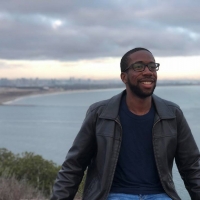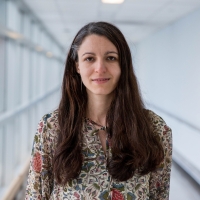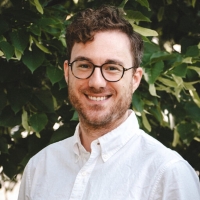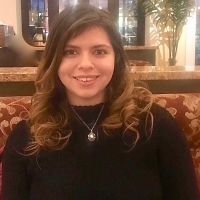Horga Lab
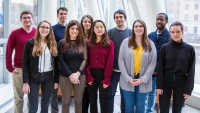
Location and Contact Information
Principal Investigator
Our lab mainly focuses on the neurobiological and computational mechanisms of psychotic symptoms in schizophrenia and of related cognitive functions in health, including sensory and reward-based learning and decision-making. Psychosis is characterized by the experience of abnormal percepts, such as hallucinations, and delusional beliefs. While excessive dopamine transmission in the striatum is known to play a role in these symptoms, the cognitive and computational mechanisms mediating psychotic experiences remain unclear. To understand these neural mechanisms, our research uses behavioral paradigms and computational tools in combination with a variety of functional, structural and molecular in vivo neuroimaging techniques (mainly functional Magnetic Resonance Imaging [fMRI] and Positron Emission Tomography [PET]) in healthy humans and patients with psychotic disorders. We also use pharmacological manipulations to understand the relationships between neurotransmission and specific neural computations, and collaborate with other groups to collect invasive and non-invasive electrophysiological data relevant to our research focus.
Sensory learning and hallucinations
Our prior research showed that voice-sensitive regions of the auditory cortex have increased activity while patients experience auditory hallucinations of voices (Horga et al., J Neurosci 2014; Horga et al., J Psychiatry Neurosci 2011). This hallucination-related increase in neural activity was further associated with abnormal learning signals, suggesting that a learning dysfunction could lead to faulty sensory attenuation and hallucinatory percepts (Horga et al., J Neurosci 2014). We have also discovered that abnormal functional connectivity between the striatum and associative cortical regions, including parts of the auditory cortex, relate to psychosis and dopamine receptor density (Horga et al., JAMA Psychiatry 2016). Our current projects aim at elucidating the relationships between dopamine abnormalities and downstream cortical dysfunctions associated with specific symptoms of psychosis and to formalize these mechanisms in a computational model of psychosis. To this end, we are also studying perceptual disturbances in people at clinical high risk for psychosis (Lehembre-Shiah et al., JAMA Psychiatry 2016) in collaboration with Ragy Girgis, MD, and the COPE Clinic at NYSPI. In an EEG study in collaboration with Nima Mesgarani, PhD, we are also investigating the dynamics of sensory gating of irrelevant stimuli during speech processing in schizophrenia and how abnormalities in sensory gating may be relevant to psychosis.
Inference and delusional beliefs
More recently, we have been focusing on the cognitive processes related to inference and belief formation in health and illness. We have developed an incentive-compatible version of the “beads task” to evaluate specific abnormalities in probabilistic inference that may relate to the formation and maintenance of psychotic symptoms, particularly delusional beliefs. We are using a number of other well-established decision-making tasks and computational models to understand whether subjective valuation can explain some of the observed behaviors attributed to delusion-proneness.
Cognitive control, reinforcement learning, and working memory
We have also studied mechanisms related to other cognitive functions in healthy individuals, including cognitive control (Horga et al., J Neurosci 2011), reinforcement learning (Horga and Maia et al., Hum Brain Mapp 2015), and working memory (Cassidy et al., J Neurosci 2016), both in terms of the neural computations that are relevant to adaptive behaviors and the network dynamics that may support them. Building on this work, we have used and are using similar paradigms to investigate cognitive dysfunctions in a number of psychiatric populations in collaboration with other groups. We also collaborate with Sameer Sheth’s group in the Neurosurgery Department at Columbia University to use invasive intra-cranial recordings and advance our understanding of these and other cognitive functions in humans.
Biomarker development
We are also interested in developing neuroimaging biomarkers that can be used to predict clinically relevant outcomes and can be ultimately used to guide clinical decision-making (Abi-Dargham and Horga, Nat Med 2016). Among other promising neuroimaging biomarkers, we are using neuromelanin-sensitive MRI as a potential candidate to predict conversion to overt illness in at risk populations for schizophrenia and Parkinson’s disease.
Lab Members
Najate Ojeil, PhD, MPH
- Clinical Director of the C3N Center
Najate Ojeil is the Clinical Director of the Clinical Cognitive Computational Neuroscience (C3N) Center. Dr. Ojeil has a Ph.D. in Psychology and a Master’s degree in Public Health. She has extensive experience in performing clinical evaluations in the context of research and is an expert in the delivery of the latest-evidence based psychological treatment, emphasizing a science-informed practice.
In her current role, she ensures quality control of the clinical operations across several rigorous NIMH funded studies. She oversees assessments of psychopathology across studies, organizes consensus diagnosis meetings, and provides both supervision and training on standard diagnostic and assessment instruments. She also oversees case management in the context of clinical cognitive and imaging research.

Nicholas Singletary, MA, PhD
- Research Scientist
Nicholas is a research scientist in the Horga Lab, where he helps manage the lab’s major research projects and advises other lab members on programming, statistics, and behavioral and fMRI data analysis. He received a B.S. in Neuroscience and Behavioral Biology from Emory University and a Ph.D. in Neurobiology and Behavior from Columbia University. During his Ph.D., co-advised by Dr. Horga and Dr. Jacqueline Gottlieb, he studied neural correlates of probabilistic inference and its influence on the desire to sample additional information. He has co-authored several articles on these topics, including a review article on how propensity to delusions may be influenced by interindividual variability in general probabilistic inference. He has presented at numerous conferences, including talks, and notably organized a panel at the Society for Neuroscience Meeting, the world’s largest neuroscience conference. Outside of work, he plays viola in a community orchestra and is a member of the New York Urban League Young Professionals.

Andra Mihali, PhD
- Postdoctoral Research Fellow
Andra Mihali is a Postdoctoral Research Fellow in the Horga Lab. She received her BA in Biochemistry from Columbia University and her PhD in Neural Science from NYU, mentored by prof. Wei Ji Ma. She worked on developing tasks aimed to quantify and understand differences in the precisions of visual representations and perceptual decisions, in neurotypicals as well as observers with ADHD. To this end, she used psychophysics, eye tracking and computational modeling. In April 2019, she joined Dr. Horga's lab, with the aim of combining these methods with neural measures of dopamine function to better understand psychosis and inform individualized treatment. Her project focuses on developing psychophysical markers to quantify perceptual distortions and understand how people make use of and update beliefs about the reliability of their sensory information.

Emmett Larsen, PhD
- Postdoctoral Research Fellow
Emmett received his PhD from Stony Brook University where he worked with Aprajita Mohanty on mechanistic studies investigating various symptoms of psychosis. His primary interest is in understanding the formation and maintenance of delusional beliefs (as well as other forms of beliefs). He uses primarily experimental methods and employs computational models of behavior and cognition.

Matthew Schafer, PhD
- Postdoctoral Research Fellow
Matthew Schafer is a Postdoctoral Research Fellow in the Horga Lab. He received his PhD in neuroscience from Mount Sinai School of Medicine. He is working on building tasks and a model of delusional beliefs.

Victoria (Tori) Fisher, BA
- PhD Student
Tori is a Ph.D. student in the Neurobiology and Behavior program at Columbia University. She received a B.A. in Neuroscience and Biology from Oberlin College in 2021. At Oberlin, she worked in the lab of Dr. Leslie Kwakye, where she investigated the relationship between attention and multisensory integration. Between her undergraduate and graduate studies, she researched the mechanisms underlying psychotic symptom emergence and hallucinogenesis in clinical and non-clinical populations as a postgraduate associate in the lab of Dr. Albert Powers at Yale University. In 2024, she joined the Horga lab, where her thesis work will focus on the neural mechanisms that give rise to auditory-verbal hallucinations.

Justin Buck, BS
- PhD Student
Justin is a Ph.D. student in the Neurobiology and Behavior program at Columbia. He graduated from the University of Maryland in 2019 with Bachelor’s Degrees in Cell Biology and Psychology. During undergrad, he worked in the lab of Dr. Kuan Wang at the National Institute of Mental Health where his research focused on developmental and evolutionary changes in dopamine circuitry in mice. Justin joined Dr. Horga’s lab in 2020, where his research will focus on the cognitive and neural mechanisms underlying psychosis.

Collaborators
Anissa Abi-Dargham, MD
- Stony Brook University
Jared Van Snellenberg, PhD
- Stony Brook University
Jacqueline Gottlieb, PhD
- Columbia University
Anna Konova, PhD
- Rutgers University
Kenneth Wengler, PhD
- Icahn School of Medicine at Mount Sinai
Previous Lab Members
Emeline Lagache, MD
- Former Postdoctoral Research Fellow
Clifford Cassidy, PhD
- Former Postdoctoral Fellow
Seth Baker, BA, MS
- Former Research Assistant
Kathleen Fan, MSc
- Former Research Assistant
Nina Diamond, BA
- Former Undergraduate Volunteer
Vanessa Rhee, BS
- Former Undergraduate Volunteer
Quincy Harrison, BS
- Former Undergraduate Student
Naomi Hollard, BA
- Former Undergraduate Student
Arianna Noya, BA
- Former Undergraduate Student
Garrett Salzman, BA
- Former Research Coordinator
Julianne Carey, MA
- Former Volunteer Graduate Student
Seth Baker
- Former Data Analyst
Sylvie Messer
- Former Research Assistant
Marianne Broeker
- Former Volunteer Graduate Student
Fabyen Ragalmuto
- Former Master's Student
Florian Ragalmuto
- Former Master's Student
Alissa Fogelson
- Former Research Coordinator
Jocelyn Kim
- Former Research Coordinator
Kenneth Wengler, PhD
- Former Postdoctoral Research Fellow
Isabella Rosario, BA
- Research Coordinator
Anastasia Velikovskaya, BA
- Research Coordinator
Brandon K. Ashinoff, PhD
- Postdoctoral Research Fellow
Muhammad Ahad Butt
- Data Analyst
Select Publications
Selected publications in reverse chronological order (*corresponding author). Read a full list of publications.
van der Pluijm M, Wengler K, Reijers PN, Cassidy CM, Tjong Tjin Joe K, de Peuter OR, Horga G, Booij J, de Haan L, van de Giessen E. Neuromelanin-Sensitive MRI as Candidate Marker for Treatment Resistance in First-Episode Schizophrenia. Am J Psychiatry. 2024 Mar 13:appiajp20220780. doi: 10.1176/appi.ajp.20220780. Epub ahead of print. PMID: 38476044. Download Publication (PDF)
Baker SC, Messer SJ, Girgis RR, Horga G. Prior overweighting relates to delusional ideation in individuals at clinical high-risk for psychosis. Schizophr Res. 2024 Apr;266:153-155. doi: 10.1016/j.schres.2024.02.022. Epub 2024 Feb 24. PMID: 38402655. Download Publication (PDF)
Singletary NM, Gottlieb J, Horga G. The parieto-occipital cortex is a candidate neural substrate for the human ability to approximate Bayesian inference. Commun Biol. 2024 Feb 9;7(1):165. doi: 10.1038/s42003-024-05821-6. PMID: 38337012; PMCID: PMC10858241. Download Publication (PDF)
Mihali A, Broeker M, Ragalmuto FDM, Horga G. Introspective inference counteracts perceptual distortion. Nat Commun. 2023 Nov 29;14(1):7826. doi: 10.1038/s41467-023-42813-2. PMID: 38030601; PMCID: PMC10687029. Download Publication (PDF)
Rubio JM, Lencz T, Cao H, Kraguljac N, Dhamala E, Homan P, Horga G, Sarpal DK, Argyelan M, Gallego J, Cholewa J, Barber A, Kane JM, Malhotra AK. Replication of a neuroimaging biomarker for striatal dysfunction in psychosis. Mol Psychiatry. 2024 Jan 4. doi: 10.1038/s41380-023-02381-9. Epub ahead of print. PMID: 38177349. Download Publication (PDF)
Wengler K, Baker SC, Velikovskaya A, Fogelson A, Girgis RR, Reyes-Madrigal F, Lee S, de la Fuente-Sandoval C, Ojeil N, Horga G. Generalizability and Out-of-Sample Predictive Ability of Associations Between Neuromelanin-Sensitive Magnetic Resonance Imaging and Psychosis in Antipsychotic-Free Individuals. JAMA Psychiatry. 2024 Feb 1;81(2):198-208. doi: 10.1001/jamapsychiatry.2023.4305. PMID: 37938847; PMCID: PMC10633403. Download Publication (PDF)
Konova AB, Ceceli AO, Horga G, Moeller SJ, Alia-Klein N, Goldstein RZ. Reduced neural encoding of utility prediction errors in cocaine addiction. Neuron. 2023 Dec 20;111(24):4058-4070.e6. doi: 10.1016/j.neuron.2023.09.015. Epub 2023 Oct 25. PMID: 37883973; PMCID: PMC10880133. Download Publication (PDF)
Larsen EM, Jin J, Zhang X, Donaldson KR, Liew M, Horga G, Luhmann C, Mohanty A. Hallucination-Proneness is Associated With a Decrease in Robust Averaging of Perceptual Evidence. Schizophr Bull. 2024 Jan 1;50(1):59-68. doi: 10.1093/schbul/sbad129. PMID: 37622401; PMCID: PMC10754164. Download Publication (PDF)
Duhamel E, Mihali A, Horga G. Effects of Hallucination Proneness and Sensory Resolution on Prior Biases in Human Perceptual Inference of Time Intervals. J Neurosci. 2023 Jul 19;43(29):5365-5377. doi: 10.1523/JNEUROSCI.0692-22.2023. Epub 2023 Jun 21. PMID: 37344236; PMCID: PMC10359030. Download Publication (PDF)
Pagliaccio D, Wengler K, Durham K, Fontaine M, Rueppel M, Becker H, Bilek E, Pieper S, Risdon C, Horga G, Fitzgerald KD, Marsh R. Probing midbrain dopamine function in pediatric obsessive-compulsive disorder via neuromelanin-sensitive magnetic resonance imaging. Mol Psychiatry. 2023 Jul;28(7):3075-3082. doi: 10.1038/s41380-023-02105-z. Epub 2023 May 17. PMID: 37198261; PMCID: PMC10189717. Download Publication (PDF)
Abi-Dargham A, Moeller SJ, Ali F, DeLorenzo C, Domschke K, Horga G, Jutla A, Kotov R, Paulus MP, Rubio JM, Sanacora G, Veenstra-VanderWeele J, Krystal JH. Candidate biomarkers in psychiatric disorders: state of the field. World Psychiatry. 2023 Jun;22(2):236-262. doi: 10.1002/wps.21078. PMID: 37159365; PMCID: PMC10168176. Download Publication (PDF)
Ashinoff BK, Buck J, Woodford M, Horga G. The effects of base rate neglect on sequential belief updating and real-world beliefs. PLoS Comput Biol. 2022 Dec 22;18(12):e1010796. doi: 10.1371/journal.pcbi.1010796. PMID: 36548395; PMCID: PMC9831339. Download Publication (PDF)
Ueno F, Iwata Y, Nakajima S, Caravaggio F, Rubio JM, Horga G, Cassidy CM, Torres-Carmona E, de Luca V, Tsugawa S, Honda S, Moriguchi S, Noda Y, Gerretsen P, Graff-Guerrero A. Neuromelanin accumulation in patients with schizophrenia: A systematic review and meta-analysis. Neurosci Biobehav Rev. 2022 Jan;132:1205-1213. doi: 10.1016/j.neubiorev.2021.10.028. Epub 2021 Oct 27. PMID: 34718049; PMCID: PMC9059704. Download Publication (PDF)
Wengler K, Cassidy C, van der Pluijm M, Weinstein JJ, Abi-Dargham A, van de Giessen E, Horga G. "Cross-Scanner Harmonization of Neuromelanin-Sensitive MRI for Multisite Studies," J Magn Reson Imaging. 2021 Oct;54(4):1189-1199. doi: 10.1002/jmri.27679. Epub 2021 May 6. PMID: 33960063. Download Publication (PDF)
Salzman G, Kim J, Horga G, Wengler K. "Standardized Data Acquisition for Neuromelanin-sensitive Magnetic Resonance Imaging of the Substantia Nigra," J Vis Exp. 2021 Sep 8;(175). doi: 10.3791/62493.PMID: 34570093 Download Publiction (PDF)
Horga G, Wengler K, Cassidy CM. "Neuromelanin-Sensitive Magnetic Resonance Imaging as a Proxy Marker for Catecholamine Function in Psychiatry," JAMA Psychiatry. 2021 Jul 1;78(7):788-789. doi: 10.1001/jamapsychiatry.2021.0927. PMID: 34009285. Download Publication (PDF)
Ashinoff BK, Singletary NM, Baker SC, Horga G. "Rethinking delusions: A selective review of delusion research through a computational lens." Schizophr Res. 2021 Mar 3:S0920-9964(21)00065-7. doi: 10.1016/j.schres.2021.01.023. Epub ahead of print. PMID: 33676820; PMCID: PMC8413395. Download Publication (PDF)
Wengler K, Horga G. "The Quest for a Selective Mapping Between Striatal Dopamine Subcircuits and Psychosis Symptoms," Biol Psychiatry Cogn Neurosci Neuroimaging. 2020 Nov;5(11):1004-1006. doi: 10.1016/j.bpsc.2020.09.009. PMID: 33161955. Download Publication (PDF)
Cassidy CM, Carpenter KM, Konova AB, Cheung V, Grassetti A, Zecca L, Abi-Dargham A, Martinez D, Horga G. "Evidence for Dopamine Abnormalities in the Substantia Nigra in Cocaine Addiction Revealed by Neuromelanin-Sensitive MRI," Am J Psychiatry. 2020 Nov 1;177(11):1038-1047. doi: 10.1176/appi.ajp.2020.20010090. Epub 2020 Aug 28. PMID: 32854531. Download Publication (PDF)
Wengler K, Goldberg AT, Chahine G, Horga G. Distinct hierarchical alterations of intrinsic neural timescales account for different manifestations of psychosis. Elife. 2020 Oct 27;9:e56151. doi: 10.7554/eLife.56151. PMID: 33107431; PMCID: PMC7591251. Download Publication (PDF)
Wengler K, He X, Abi-Dargham A, Horga G. "Reproducibility assessment of neuromelanin-sensitive magnetic resonance imaging protocols for region-of-interest and voxelwise analyses," Neuroimage. 2020 March;208:116457. Download Publication (PDF)
Horga G, Abi-Dargham A. "An integrative framework for perceptual disturbances in psychosis," Nat Rev Neurosci. 2019 December;20(12):763-778. Download Publication (PDF)
Smith EH, Horga G, Yates MJ, Mikell CB, Banks GP, Pathak YJ, Schevon CA, McKhann GM 2nd, Hayden BY, Botvinick MM, Sheth SA. "Widespread temporal coding of cognitive control in the human prefrontal cortex," Nat Neurosci. 2019 Nov;22(11):1883-1891. Download Publication (PDF)
Seth C. Baker, Anna B. Konova, Nathaniel D. Daw and Guillermo Horga. "A distinct inferential mechanism for delusions in schizophrenia," Brain: A Journal of Neurology. 2019 Jan 16: 142; 1797-1812. Download Publication (PDF)
Sulzer D, Cassidy C, Horga G, Kang UJ, Fahn S, Casella L, Pezzoli G, Langley J, Hu XP, Zucca FA, Isaias IU, Zecca L. “Neuromelanin detection by magnetic resonance imaging (MRI) and its promise as a biomarker for Parkinson's disease.” NPJ Parkinsons Dis. 2018 Apr 10. Download Publication (PDF).
Clifford M. Cassidy, Fabio A. Zucca, Ragy R. Girgis, Seth C. Baker, Jodi J. Weinstein, Madeleine E. Sharp, Chiara Bellei, Alice Valmadre, Nora Vanegas, Lawrence S. Kegeles, Gary Brucato, Un Jung Kang, David Sulzer, Luigi Zecca, Anissa Abi-Dargham, and Guillermo Horga. "Neuromelanin-sensitive MRI as a noninvasive proxy measure of dopamine function in the human brain," PNAS. March 12, 2019 116 (11) 5108-5117. Download Publication (PDF)
Cassidy CM, Balsam PD, Weinstein JJ, Rosengard RJ, Slifstein M, Daw ND, Abi-Dargham A, Horga G. “A Perceptual Inference Mechanism for Hallucinations Linked to Striatal Dopamine.” Curr Biol. 2018 Feb 19. Download Publication (PDF)
Lehembre-Shiah E, Leong W, Brucato G, Abi-Dargham A, Lieberman JA, Horga G*, Girgis RR*. Distinct Relationships Between Visual and Auditory Perceptual Abnormalities and Conversion to Psychosis in a Clinical High-Risk Population. JAMA Psychiatry. 2016 Nov 16. Download Publication (PDF)
Abi-Dargham A, Horga G. The search for imaging biomarkers in psychiatric disorders. Nat Med. 2016 Nov;22(11):1248-1255. Download Publication (PDF)
Alderson-Day B, Diederen K, Fernyhough C, Ford JM, Horga G, Margulies DS, McCarthy-Jones S, Northoff G, Shine JM, Turner J, van de Ven V, van Lutterveld R, Waters F, Jardri R. Auditory Hallucinations and the Brain's Resting-State Networks: Findings and Methodological Observations. Schizophr Bull. 2016 Sep;42(5):1110-23. Download Publication (PDF)
Horga G*, Cassidy CM, Xu X, Moore H, Slifstein M, Van Snellenberg JX, Abi-Dargham A. “Dopamine-related disruption of functional topography of striatal connections in unmedicated patients with schizophrenia,” JAMA Psychiatry. 2016 Aug 1;73(8):862-70. Download Publication (PDF)
Reinen JM, Van Snellenberg JX, Horga G, Abi-Dargham A, Daw ND, Shohamy D. Motivational Context Modulates Prediction Error Response in Schizophrenia. Schizophr Bull. 2016 Nov;42(6):1467-1475. Download Publication (PDF)
Cassidy CM, Van Snellenberg JX, Benavides C, Slifstein M, Wang Z, Moore H, Abi-Dargham A, Horga G*. "Dynamic connectivity between brain networks supports working memory: relationships to dopamine release and schizophrenia," J Neurosci. 2016 Apr 13;36(15):4377-88. Download Publication (PDF)
Van Snellenberg JX, Girgis RR, Horga G, van de Giessen E, Sliftein M, Ojeil N, Weinstein JJ, Moore H, Lieberman JA, Shohamy D, Smith EE, Abi-Dargham A. “Mechanisms of working memory impairment in schizophrenia,” Biol Psychiatry. 2016 Oct 15;80(8):617-26. Download Publication (PDF)
Colibazzi T, Horga G, Wang Z, Huo Y, Corcoran C, Klahr K, Brucato G, Girgis R, Gill K, Abi-Dargham A, Peterson BS. “Neural Dysfunction in Cognitive Control Circuits in Persons at Clinical High-Risk for Psychosis,” Neuropsychopharmacology. 2016 Apr;41(5):1241-50. Download Publication (PDF)
Horga G, Maia TV, Marsh R, Hao X, Xu D, Duan Y, Tau GZ, Graniello B, Wang Z, Kangarlu A, Martinez D, Packard MG, Peterson BS. “Changes in Corticostriatal Connectivity During Reinforcement Learning in Humans,” Hum Brain Mapp. 2015 Feb;36(2):793-803. Download Publication (PDF)
Horga G*, Schatz KC, Abi-Dagham A, Peterson BS. “Deficits in Predictive Coding Underlie Hallucinations in Schizophrenia,” J Neurosci. 2014 Jun 11;34(24):8072-82. Download Publication (PDF)
Horga G, Abi-Dargham A. “The Striatum and Dopamine: A Crossroad of Risk for Schizophrenia,” JAMA Psychiatry. 2014 May 12. Download Publication (PDF)
Horga G*, Fernandez-Egea E, Mane A, Font M, Schatz KC, Falcon C, Lomena F, Bernardo M, Parellada E. “Brain metabolism during hallucination-like auditory stimulation in schizophrenia,” PLoS One. 2014 Jan 8;9(1): e84987. Download Publication (PDF)
Peterson BS, Wang Z, Horga G, Warner V, Liu J, Graniello G, Rutherford B, Gerber A, Wickramaratne P, Garcia F, Wang P, Yu S, Hao X, Adams PB, Klahr KW, Qian M, Weissman MM. “Brain Activations Discriminate Risk and Resilience Endophenotypes From Markers of Lifetime Illness in Familial Major Depressive Disorder,” JAMA Psychiatry. 2014 Feb;71(2):136-48. Download Publication (PDF)
Marsh R, Horga G, Parashar N, Wang Z, Peterson BS, Simpson HB. “Altered Activation in Fronto-Striatal Circuits During Sequential Processing of Conflict in Unmedicated Adults with Obsessive-Compulsive Disorder,” Biol Psychiatry. 2013 Apr 15;75(8):615-22. Download Publication (PDF)
Horga G, Maia TV, Wang P, Wang Z, Marsh R, Peterson BS. “Adaptation to conflict via context-driven anticipatory signals in the dorsomedial prefrontal cortex,” J Neurosci. 2011 Nov 9;31(45):16208-16. Download Publication (PDF)
Horga G, Maia TV. Conscious and unconscious processes in cognitive control: a theoretical perspective and a novel empirical approach. Front Hum Neurosci. 2012 Jul 4;6:199. Download Publication (PDF)
Marsh R, Horga G, Wang Z, Wang PW, Klahr KW, Berner LA, Walsh BT, Peterson BS. “An fMRI study of self-regulatory control and conflict resolution in adolescents with Bulimia Nervosa,” Am J Psychiatry. 2011 Nov;168(11):1210-20. Download Publication (PDF)
Horga G, Bernacer J, Dusi N, Entis JJ, Kingwai Chu, Hazlett EA, Haznedar MM, Kemether E, Byne W, Buchsbaum MS. “Correlations between ventricular enlargement and gray and white matter volumes of cortex, thalamus, striatum and internal capsule in schizophrenia,” Eur Arch Psychiatry Clin Neurosci. 2011 Mar 24. Download Publication (PDF)
Horga G, Parellada E, Lomena F, Fernandez-Egea E, Mane A, Font M, Falcon C, Konova A, Pavia J, Ros D, Bernardo M. “Differential brain glucose metabolic patterns in antipsychotic-naive first episode schizophrenia with and without auditory verbal hallucinations,” J Psychiatry Neurosci. 2011 Jan 1;36(1):100085. Download Publication (PDF)


